Manning School’s Amit Deokar Kicks Off New Roundtable Series with Tech Talk
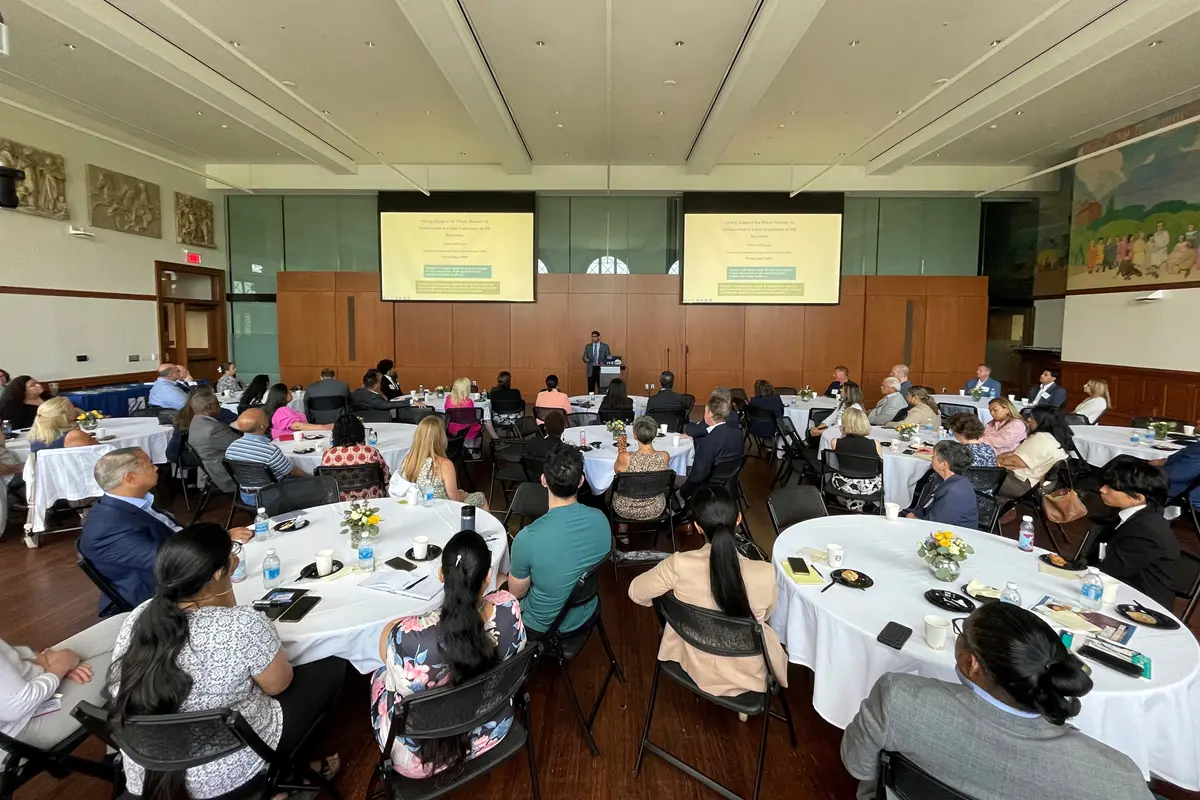 Image by Ed Brennen
Image by Ed Brennen
Nearly 80 local business leaders came together at Coburn Hall recently for Manning School of Business Assoc. Dean Amit Deokar's talk, "Leveraging Generative AI: Opportunities and Challenges in the New Era of Work."
06/07/2024
By Ed Brennen
Gasps of amazement — the kind you hear from an audience when a magician saws their assistant in half — filled the Coburn Hall ballroom as Manning School of Business Assoc. Dean Amit Deokar hit return on his keyboard, triggering ChatGPT to generate Python code from a chart of coffee sales data.
“We are all programmers now,” Deokar declared as the code appeared instantaneously on a pair of projection screens behind him, demonstrating the transformative potential of generative AI in the workplace.
Deokar, an associate professor of management information systems, shared his AI expertise with nearly 80 local business leaders during his recent talk, “Leveraging Generative AI: Opportunities and Challenges in the New Era of Work.”
It was the inaugural event of a new Business Leaders Roundtable series hosted by UMass Lowell, Enterprise Bank and the Middlesex 3 Coalition, a regional economic development partnership.
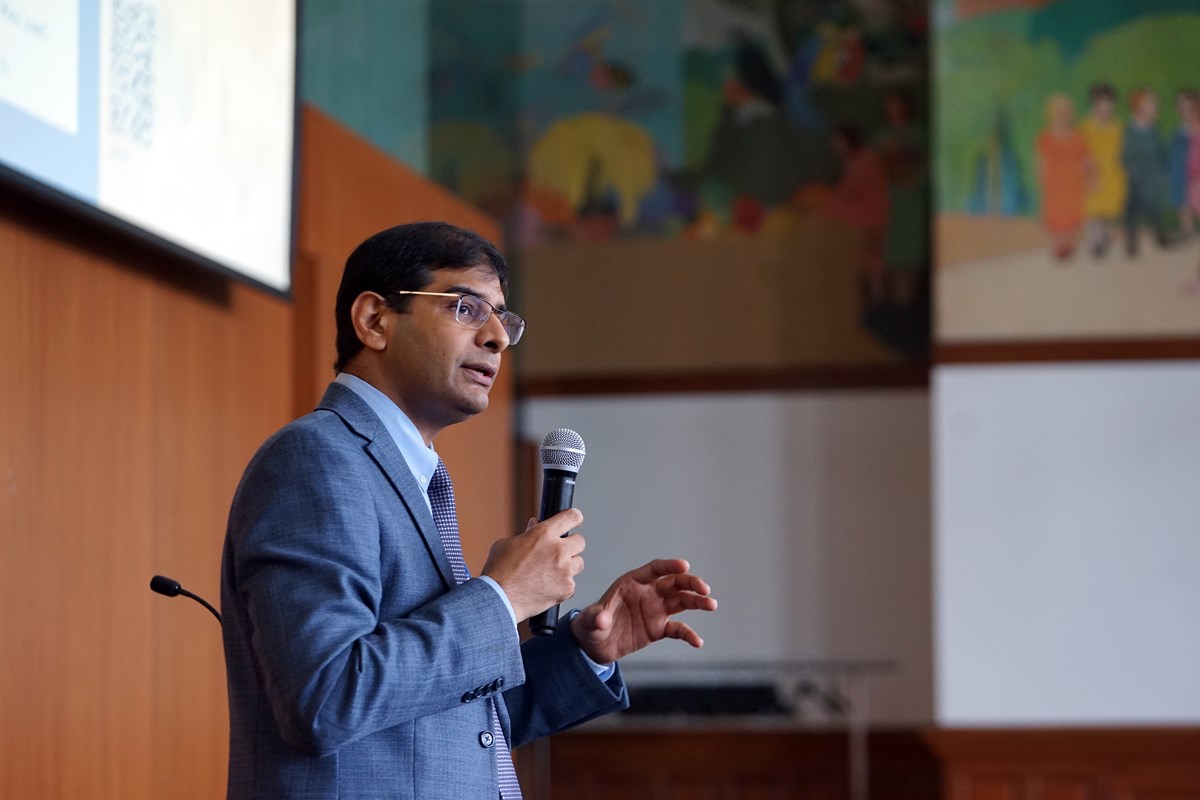 Image by Ed Brennen
Image by Ed Brennen
Manning School Assoc. Dean Amit Deokar discussed the current state of AI technology and offered suggestions on how businesses can integrate the technology into their workplaces.
“Generative AI is here to stay. It has the potential to improve productivity, but you have to lean in and embrace it — with an eye toward managing risks,” said Deokar, who gave an overview of the current state of the rapidly developing technology and offered guidance on how businesses can integrate it into the workplace.
“People think there is a hidden instruction manual that is coming out, and the truth is, there isn’t one. And that’s kind of unnerving at this point,” said Deokar, who encouraged audience members to experiment with the technology to see what it can and cannot do.
Deokar cited a recent survey that showed 43% of professionals are already using ChatGPT for work-related tasks, and that 68% of those workers are hiding it from their employers, perhaps because they fear being deemed replaceable by AI. Deokar said organizations should foster a culture of openness and experimentation around the technology, noting that companies such as AT&T and Deloitte have started “citizen developer” initiatives in which teams of non-technical employees use AI to streamline tasks and solve problems.
Deokar reminded the audience that generative AI doesn’t really “know” anything — it’s just predicting the next word — and that its only goal is to make the user happy, not to be accurate.
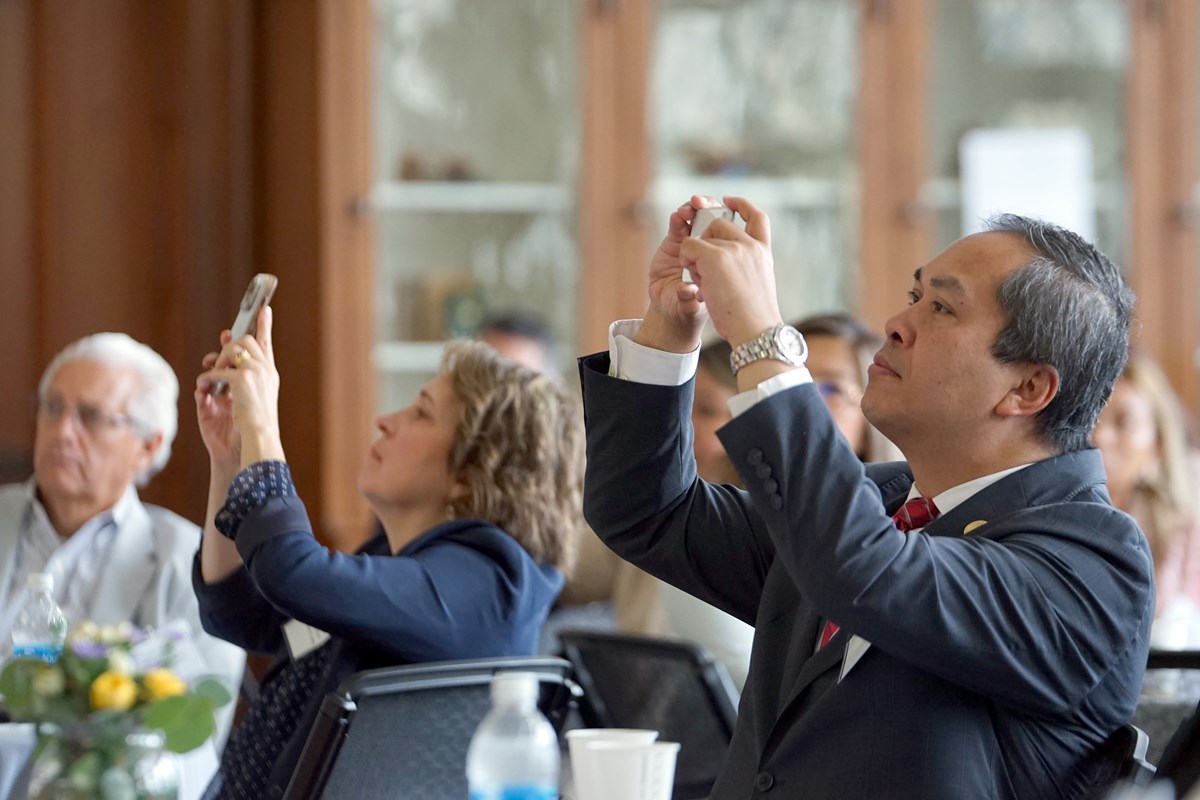 Image by Ed Brennen
Image by Ed Brennen
Middlesex 3 Coalition Executive Director Stephanie Cronin and Lowell City Councilor Sokhary Chau snap photos of a slide during Amit Deokar's presentation on AI.
“Think of AI as an incredibly fast employee who is prone to bending the truth,” he said, drawing chuckles from the crowd.
In her introduction of Deokar, Rist Family Endowed Dean of the Manning School of Business Bertie Greer compared the current AI revolution to the automation of the U.S. automobile industry in the 1980s. For nearly a decade, Greer worked in engineering and supervisory roles at Ford Motor Company and Chrysler/Jeep-Eagle, where her job was to integrate robotics into manufacturing to improve efficiency.
“People could not handle what was coming, just like you hear people today,” said Greer, whose first research project as an MBA student at the University of Toledo was on how companies could help employees deal with computer anxiety.
“The good thing is we are talking about AI now, we have resources to help employees, and we’re preparing,” she said.
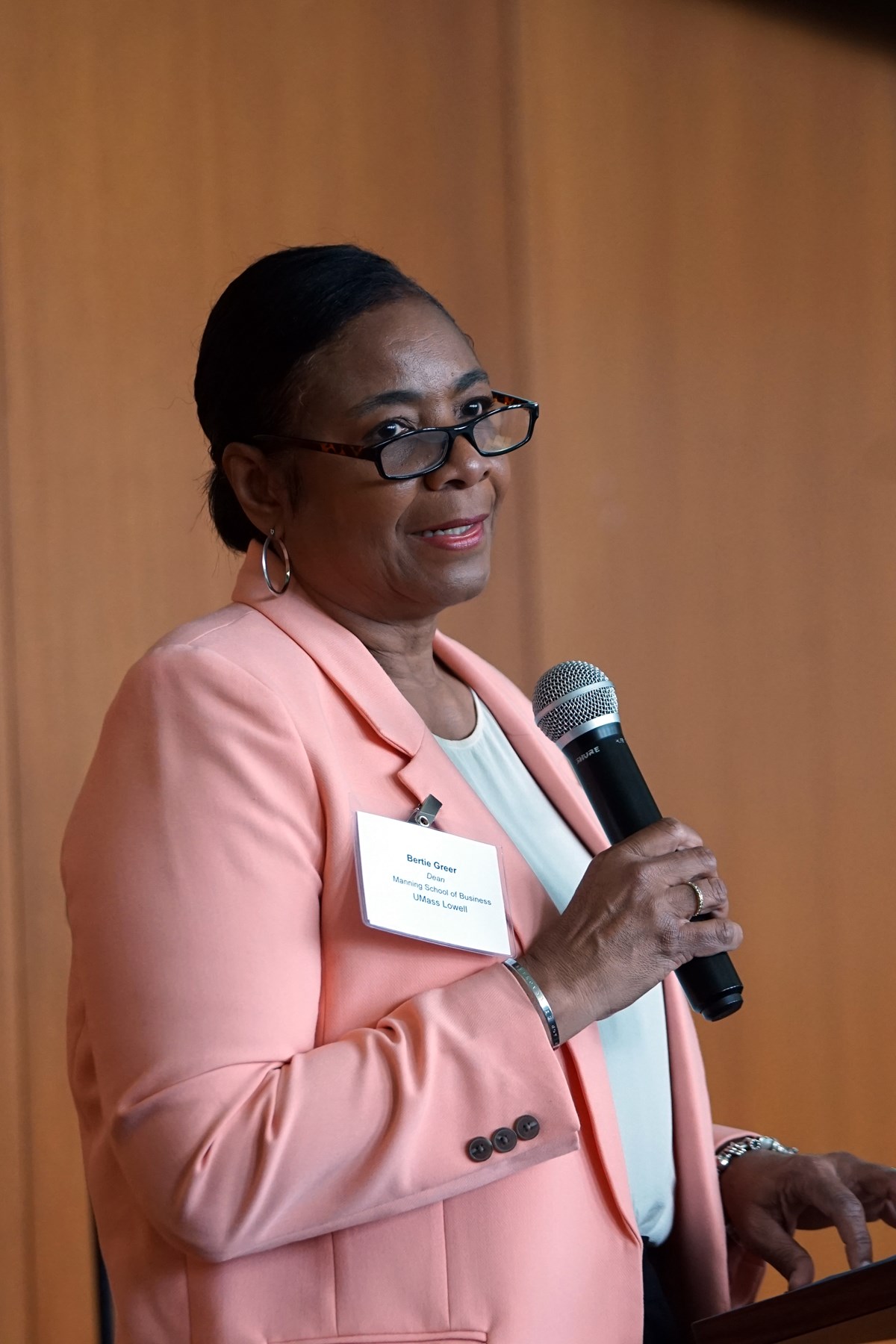 Image by Ed Brennen
Image by Ed Brennen
Manning School of Business Dean Bertie Greer, who worked in the automotive industry when it was being automated in the 1980s, compared those challenges to the current AI revolution.
Ken Feyl of LYF Architects in Andover, Massachusetts, has yet to use generative AI but came away from the roundtable ready to try it.
“My commercial real estate network is talking about AI, and I wanted to learn more about it,” said Feyl, who can see it being useful for proposal writing, documentation and field reports, and perhaps as “inspiration” for design work.
Jetari Veal, assistant vice president of Workers Credit Union in Littleton, Massachusetts, has dabbled with AI but realized after Deokar’s presentation that “there’s way more to it than I even imagined.”
“As someone who assesses the needs of the community, it’s imperative to understand AI from a business perspective, to see what we can do to leverage information and provide opportunity,” he said.
Allison Lamey, executive director of The Lowell Plan, appreciated Deokar's ability to provide context for AI’s use in business.
“This was a great way to capitalize on the talent and resources at UMass Lowell to help inform the business community,” she said.
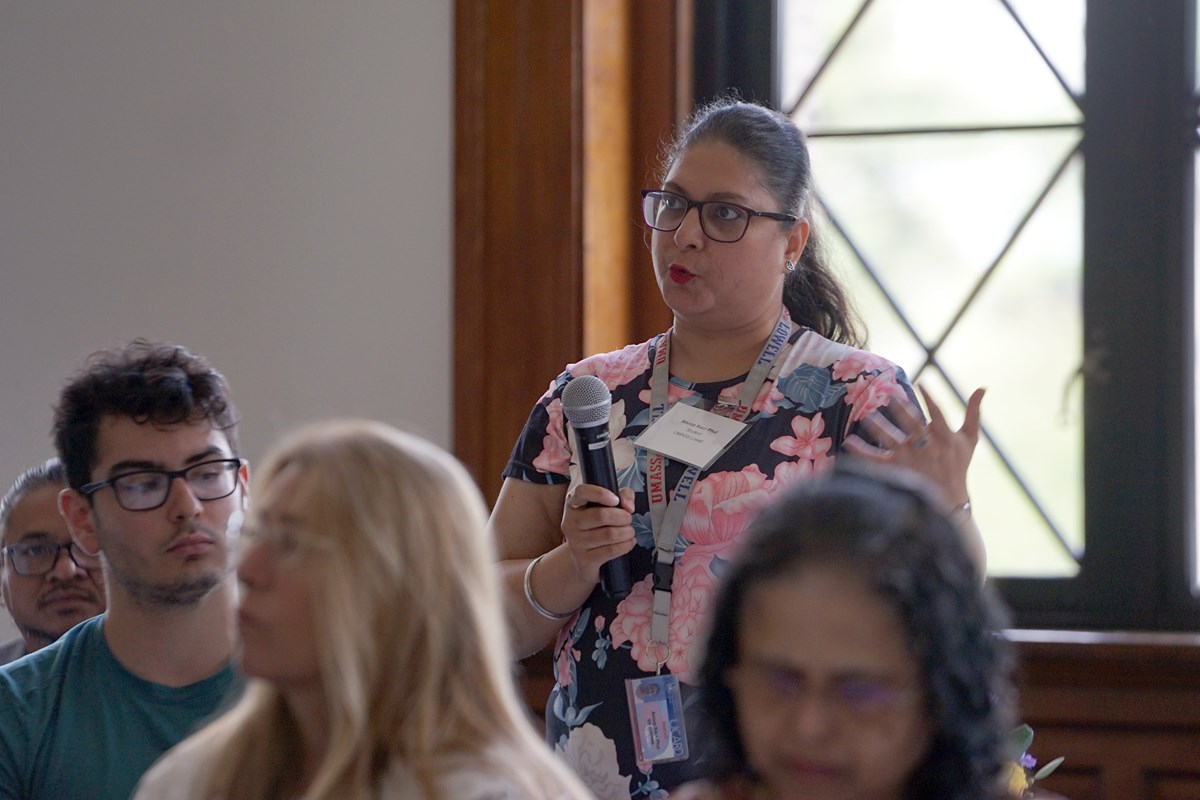 Image by Ed Brennen
Image by Ed Brennen
Graduate student Anoop Kaur Phul, who is pursuing a master of public health, asks a question during the roundtable discussion on AI at Coburn Hall.
Tom O’Donnell, senior director of innovation and workforce development at UML, and his team partnered with Enterprise Bank Executive Vice President Chet Szablak and Middlesex 3 Coalition Executive Director Stephanie Cronin on the roundtable series “to get people together around important topics that are changing the way we work, live and learn.”
Future topics could include leadership development, data analytics and sustainability.
Deokar told the business leaders that UML students who are becoming proficient with AI today will soon be bringing those skills to the workforce.
“These graduates are your next employees. They are going to be conversant with these technologies,” he said.
And for those who feel bewildered by AI, Deokar reminded them that email raised a lot of the same questions and concerns 40 years ago.
“We figured it out, and we’re going to figure AI out,” he said. “We’re all in this together.”
